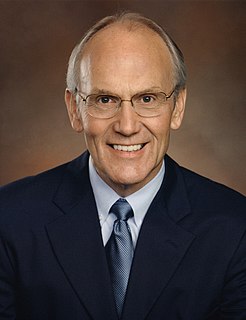A Quote by Robert A. Williams, Jr.
What John Marshall says is that right of occupancy can be taken away by purchase, conquest or any other means. So the reason that this case Johnson v. M'Intosh is so important is it really sets the foundation for this radical approach to understanding the basic human rights of Indian people to hold and control the lands that they occupy. It gives the US government the right to relocate, it stands at the bottom of the ethnic cleansing campaigns, for example, in the removal era.
Quote Topics
Any
Approach
Away
Basic
Basic Human Rights
Bottom
Campaigns
Case
Cleansing
Conquest
Control
Era
Ethnic
Ethnic Cleansing
Example
For Example
Foundation
Gives
Government
Hold
Human
Human Rights
Important
Indian
Indian People
John
Johnson
Lands
Marshall
Means
Occupy
Other
People
Purchase
Radical
Really
Reason
Removal
Right
Rights
Says
Sets
Stands
Taken
Understanding
Us
Related Quotes
We hold that the ownership of private property is the right and privilege of every American citizen and is one of the foundation stones upon which this nation and its free enterprise system has been built and has prospered. We feel that private property rights and human rights are inseparable and indivisible. Only in those nations that guarantee the right of ownership of private property as basic and sacred under their law is there any recognition of human rights.
Any unarmed people are slaves, or are subject to slavery at any given moment. If the guns are taken out of the hands of the people and only the pigs have guns, then it's off to the concentration camps, the gas chambers, or whatever the fascists in America come up with. One of the democratic rights of the United States, the Second Amendment to the Constitution, gives the people the right to bear arms. However, there is a greater right; the right of human dignity that gives all men the right to defend themselves.
The inviolability of the person which is a reflection of the absolute inviolability of God, finds its primary and fundamental expression in the inviolability of human life. Above all, the common outcry, which is justly made on behalf of human rights-for example, the right to health, to home, to work, to family, to culture- is false and illusory if the right to life, the most basic and fundamental right and the condition for all other personal rights, is not defended with maximum determination.
In the first part of 'Rights of Man' I have endeavoured to show...that there does not exist a right to establish hereditary government...because hereditary government always means a government yet to come, and the case always is, that the people who are to live afterwards, have always the same right to choose a government for themselves, as the people had who have lived before them.
The way we need to view aid is as a fulfillment of rights, and Mexico, as other countries around the world, have agreed and signed the Universal Declaration of Human Rights and the covenants of Human Rights and that includes the right to food, the right to water, the right to housing and the right to education.
For us democracy is a question of human dignity. And human dignity is political freedom, the right to freely express opinion and the right to be allowed to criticise and form opinions. Human dignity is the right to health, work, education and social welfare. Human dignity is the right and the practical possibility to shape the future with others. These rights, the rights of democracy, are not reserved for a select group within society, they are the rights of all the people.
the right to marry whoever one wishes is an elementary human right ... Even political rights, like the right to vote, and nearly all other rights enumerated in the Constitution, are secondary to the inalienable human rights to 'life, liberty and the pursuit of happiness' proclaimed in the Declaration of Independence; and to this category the right to home and marriage unquestionably belongs.
In its proper meaning equality before the law means the right to participate in the making of the laws by which one is governed, a constitution which guarantees democratic rights to all sections of the population, the right to approach the court for protection or relief in the case of the violation of rights guaranteed in the constitution, and the right to take part in the administration of justice as judges, magistrates, attorneys-general, law advisers and similar positions.
The first right of every human being is the right of self-defense. Without that right, all other rights are meaningless. The right of self-defense is not something the government bestows upon its citizens. It is an inalienable right, older than the Constitution itself. It existed prior to government and prior to the social contract of our Constitution.
Government is necessary, but the only rights we can delegate to government are the ones we possess. For example, we all have a natural right to defend ourselves against predators. Since we possess that right, we can delegate authority to government to defend us. By contrast, we don't have a natural right to take the property of one person to give to another; therefore, we cannot legitimately delegate such authority to government.
This, then, is the truth of the discourse of universal human rights: the Wall separating those covered by the umbrella of Human Rights and those excluded from its protective cover. Any reference to universal human rights as an 'unfinished project' to be gradually extended to all people is here a vain ideological chimera - and, faced with this prospect, do we, in the West, have any right to condemn the excluded when they use any means, inclusive of terror, to fight their exclusion?



































